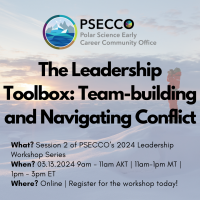‘The Leadership Toolbox: Team-building and Navigating Conflict’ - Workshop #2 of the 2024 Leadership Workshop Series

March 20, 2024
On March 13, 2024, PSECCO hosted the second workshop of the 2024 Leadership Skills Workshop Series entitled ‘The Leadership Toolbox: Team-building and Navigating Conflict’.
The recording for this event can be accessed here.
In the recording you can learn strategies to leverage inevitable conflicts to improve team trust and cohesion from our experienced workshop facilitators and guest panelists (noted below). Tips related to how to improve communication across team roles, emphasizing the empowerment of every individual, regardless of their position were also shared. The workshop concluded with interactive role-playing scenarios to reinforce how to implement the tools for managing conflict.
Relevant resources and links shared during the workshop include:
The Miro Board used during the workshop to ask panelists questions and used for workshop exercises later in the workshop can be accessed here.
Here is a link to a quick reference sheet for the 5 C’s of conflict resolution
Here is a link to an article on Conflict Resolution Strategies
Panelists for the workshop included:
Dr. Christina Hulbe
Professor, University of Otago, NZ
Dr Christina Hulbe (she/they/ia) is Professor in Te Kura Kairūri, the National School of Surveying at the University of Otago, Ōtepoti Dunedin, Aotearoa New Zealand. She has broad academic leadership experience as a department head, Dean of School, chair of her university’s Equity Advisory Committee, and in multi-institutional, interdisciplinary research programmes. Her approach to mentoring relies heavily on whiteboards and colored markers. Christina began her Antarctic career working with Ian Willans on what was at the time named Ice Stream B. Since then, she has focused on the application of numerical models and remote sensing data to improve process understanding of ice mechanics and dynamics, mainly in West Antarctica, alongside data-driven studies of equity issues in the natural sciences. She earned her BS in Geological Engineering at Montana Tech, her MS in Geology at The Ohio State University and her PhD in Geophysics at the University of Chicago (1998). She moved to Otago in 2013. Christina is engaged in university and international service activities, including co-managing the Tawaki piki toka Eastern Rockhopper Penguin campaign for Aotearoa New Zealand’s Bird of the Year. You really should ask her about these amazing birds.
Dr. Michael G. Baker
Seismologist, Sandia National Labs
Michael G. Baker is a seismologist in the Geophysics Department at Sandia National Laboratories. His current research interests are on the use of distributed acoustic sensing in polar coastal waters, and for tracking of nearfield urban and subsurface events. He has ten years' worth of field seasons in both the Arctic and Antarctic and has steadfastly failed to ever witness the aurora. He has a PhD in Geophysics from Colorado State University (2020) and a BS in Physics & Astronomy from Northern Arizona University (2003).
Dr. Marianne Karplus
Associate Professor, University of Texas El Paso
Marianne Karplus, Ph.D., is a Seismologist and Associate Professor in Earth, Environmental, and Resource Sciences at The University of Texas at El Paso. She is a co-PI of the NSF- and NERC-funded Thwaites Interdisciplinary Margin Evolution (TIME) project, using seismology to study the structure and dynamics at the eastern shear margin of Thwaites Glacier and better understand its potential contribution to sea level rise. She co-led or led four multi-month field seasons in West Antarctica for the TIME project. She has also led geophysics field teams investigating earth structure, earthquakes, and tectonics in the Nepalese Himalaya, Juneau Icefield, Tibetan Plateau, Yellowstone National Park, West Texas, Valles Caldera, and a variety of other locations. She loves being part of diverse field teams and introducing early career scientists to seismological field work. She serves as the Faculty Graduate Student Advisor, and she teaches Geophysics & Hydrology Field Camp for her department. She earned a BA in Earth Sciences and Math, with a minor in Physics, from Dartmouth College (2004). She has a Ph.D. in Geophysics from Stanford University (2012) and completed a postdoc at University of Southampton, UK (2012-2014) before moving to UTEP in 2015.
Dr. Max C. Stevens
Assistant research scientist in the Earth System Science
Interdisciplinary Center (ESSIC) at the University of Maryland
Max Stevens is an assistant research scientist at the University of Maryland and a member of the Cryospheric Sciences Laboratory at NASA Goddard. His research focuses on understanding surface snow and firn processes on glaciers and ice sheets and representing those processes in numerical models of varying complexities. In addition to his modeling work, he has participated in numerous field campaigns in Antarctica, Greenland, Alaska, and the Washington Cascades. He received his PhD in 2018 from the University of Washington. Prior to his career in academia, he taught outdoor and leadership skills as a course leader for NOLS.
Thank you to Tasha Snow and Elisa McGhee for conducting such a meaningful event for the polar science early career community. We had more than 34 attendees ranging from PhD students to PIs, and participation was exceptional. Thank you to everyone who was able to join us for the event!
We would love to see you at the third and final workshop 'Leadership from Above and Below: Building Safe and Constructive Work Atmospheres – April 3rd – 11am to 1pm', which you can register for here.
Additionally, you’re welcome to join the PSECCO Community if you haven’t already! Connect with us by subscribing to our monthly newsletter, engaging with the community Slack space, or joining the PSECCO listserv: https://psecco.org/join-psecco-community.
Be sure to check out our upcoming events as well, and we hope to see you soon!